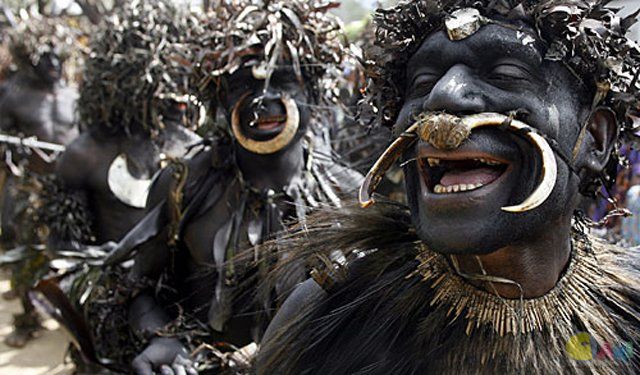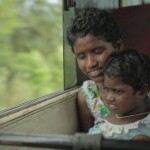
In today’s society, we have to be careful about how we view and portray cultural practices as due to our own ignorance and conditioning as inhabitants of the West, which are heavy influenced by Eurocentric theories, we are prone to condemn things that are unfamiliar to us or might deem them to be “barbaric.” As we have seen with the practice of female genital circumcision, there continues to be discord between what many of us might consider inhumane practices and what might be viewed as by some as “sacred cultural practices.” The difficulty comes in when we as individuals have to assess and judge for ourselves what practices should be protected and respected for their cultural significance and which practices should be deemed inhumane regardless of their cultural importance.
Such is the case of the practice of masculinisation as it is conducted by the Sambia Tribe in Papua New Guinea. This ritual, which is a symbol of a young boy’s rite of passage to manhood, starts when a boy is between the ages of 6 to 10 and comprises of 6 stages. Imperative to the processes and teaching of the initial ceremony is the notion that women can be dangerous to men. To become a man, and in essence a “warrior,” these young men are taught how to detach themselves from their mothers and the women around them as a means of showing that they can live without them and prove their masculinity.
The six stage process of affirming one’s manhood can take anywhere from 10 to 15 years until these young men give birth to a child. Much of the initiation and training is characterizes by what some have deemed to be highly eroticized and sexual. In the first stages, a sharp stick of cane is inserted deeply into the young boy’s nostrils until he bleeds profusely. The young boys are also introduced to older warriors who are told that bachelors are going to “copulate” with them to make them grow. Throughout much of the 6 stages, the act of having the stick of cane inserted into the nostrils and the performance of “fallatio” are integral to the process of becoming a man. While the former practice is often derided by many as “inhumane” and the latter is often referred to as “homosexual” behaviour, the Sambia’s understanding and purpose behind these two processes differs from our conventional understanding.
While many of us might view the practice of inserting the cane stick into the nostrils as being “inhumane,” because of the obvious infliction of pain and injury to the body, for the Sambia it is a symbol of strength and his ability to sustain pain, which is a needed requirement of a warrior. Additionally, the act of performing fellatio and the act of ingesting semen is seen as an integral part of manhood because boys are unable to mature into men unless they ingest semen and they adhere to the notion that all men have, “eaten the penis”. According to Sambia belief, the semen of a man possesses the “masculine spirit,” which young boys will be able to attain through his ingestion of semen.
Regardless of our own personal beliefs and understanding about these practices, it is imperative that we are at least cognizant of their significance and purpose. For example, while many of us might brand these young men and boys “homosexuals” in the sense that they have a lasting desire for men without the need or desire for a woman, once they have passed their rite of passage into manhood, they marry women and become fathers. In addition, the sexual attachment associated with our conventional understanding of homosexuality is no there. Instead, the practice is seen as a necessary and integral part of becoming a man.
There will always be cultural practices that many of us are unable to understand and ascertain their logic and purpose. However, that does not mean that we should automatically ascribe our personal feelings to those practices which are foreign to us. Instead, we should at least try to understand their significance and intended purpose. While we might not necessarily agree with them, we will at least have the knowledge that they are not “baseless acts” with the sole intention of dehumanizing the people they affect.
Real men drink semen? | Sambia Tribe’s initiation from Boyz to Men
Inspired by Bob Marley’s philosophy “None but ourselves can free our mind”, Orijin is unique “Culture Brand” connecting all African descendants together through it’s Fashion brand and thought provoking magazine to influence our lifestyles world wide….We Don’t just WEAR Culture, We SHARE Culture.
Below is a sneak peek of our Online Store.
Latest posts by Nekita (see all)
- Before Rihanna there was Grace Jones - December 27, 2014
- Marimba: Expression of Freedom, yet my Afro-Ecuadorians… - December 25, 2014
- Who Makes Claim to Being the Reggae Capital of the World? - December 24, 2014





Pingback: Aberglaube: Samenspende im Urwald | Wirklich skeptisch
Pingback: What is a REAL MAN? | Success & Fulfillment
Pingback: 14 Strange, Interesting Facts About Sex You Didn't Know